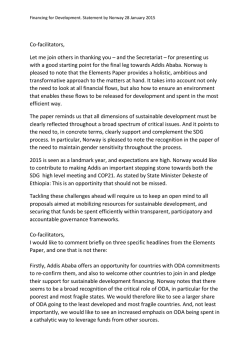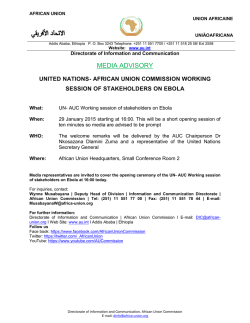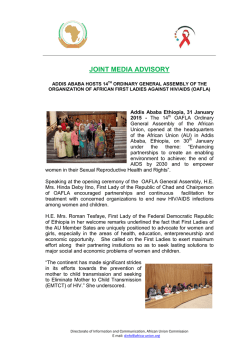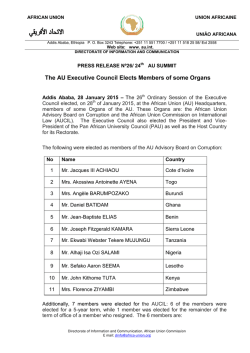
AA-Postscript 2.qxp:Layout 1
TUESDAY, FEBRUARY 3, 2015 I N T E R N AT I O N A L Auschwitz officer charged with over 3k murder cases BERLIN: A 93-year-old former Auschwitz death camp officer will go on trial in Germany in April charged with at least 300,000 counts of accessory to murder, a court said yesterday. The German defendant, Oskar Groening, will face charges over the 425,000 people believed to have been deported to the camp in occupied Poland between May and July 1944, at least 300,000 of whom were killed in the gas chambers. The regional court in the northern city of Lueneburg said the trial, expected to be one of the last of its kind, would start on April 21. Fifty-five co-plaintiffs, mainly survivors and victims’ relatives, will be represented at the trial. Groening, then a member of the Nazi Waffen-SS, was tasked with counting the banknotes gathered from prisoners’ luggage and passing them on to the SS authorities in Berlin, prosecutors in the northern city of Hanover said when he was charged in September. For this reason, he was known as the “bookkeeper” of Auschwitz. The accused also helped remove the luggage of victims so it was not seen by new arrivals, thus covering up the traces of mass killing, according to the prosecutors. They said the defendant was aware that the predominantly Jewish prisoners deemed unfit to work “were murdered directly after their arrival in the gas chambers of Auschwitz”. Ashamed for decades Groening told German daily Bild in 2005 that he regretted working at Auschwitz, saying he still heard the screams from the gas chamber decades later. “I was ashamed for decades and I am still ashamed today,” said Groening, who was employed from the age of 21 at the camp, which was liberated 70 years ago last week. “Not of my acts, because I never killed anyone. But I offered my aid. I was a cog in the killing machine that eliminated millions of innocent people.” The German office investigating Nazi war crimes sent files on 30 former Auschwitz personnel to state prosecutors in 2013 with a recommendation to bring charges against them. The renewed drive to bring to justice the last surviving perpetrators of the Holocaust follows a 2011 landmark court ruling. For more than 60 years German courts had only prosecuted Nazi war criminals if evidence showed they had personally committed atrocities. But in 2011 a Munich court sentenced John Demjanjuk to five years in prison for complicity in the extermination of Jews at the Sobibor camp, where he had served as a guard, establishing that all former camp guards can be tried. About 1.1 million people, mostly European Jews, perished at Auschwitz-Birkenau, operated by the Nazis from 1940 until it was liberated by Soviet forces on January 27, 1945. —AFP Ex-IMF chief Strauss-Kahn goes on trial for pimping Disgraced economist returns to court LILLE: Ex-IMF chief Dominique Strauss-Kahn went on trial yesterday for pimping as part of a prostitution ring, four years after a sex scandal cost him his job and a shot at the French presidency. The disgraced 65-year-old economist found himself back in the dock-this time in the northern French city of his hands in his pockets in front of the imposing stone bench, where over 40 massive files were stacked. He appeared on edge as he sat, arms folded, while presiding judge Bernard Lemaire read out the charges against him and 13 coaccused, a colorful cast of characters including luxury hotel man- applications, such as a request by a lawyer for the former prostitutes involved for hearings to take place behind closed doors, were expected to dominate the first day of the trial. Lurid details of group sex and high-end prostitution are likely to emerge in the trial for “aggravated LILLE: French-born pimp and defendant Dominique Alderweireld or “Dodo la Saumure” arrives at the courthouse on the first day of the so-called “Carlton Case” trial. —AFP Lille-accused of being at the centre of a vice ring which hired prostitutes for sex parties in Brussels, Paris and Washington. A silver-haired Strauss-Kahn, dressed in a dark suit, slipped past a throng of journalists to arrive early in the wood-paneled courtroom, where he paced up and down with agers, police, and a brothel owner nicknamed “Dodo the Pimp.” “You are accused of aiding and abetting the prostitution of seven persons between March 29, 2008 and October 4, 2011, and of hiring and encouraging the prostitution of these same persons,” Lemaire told Strauss-Kahn. Procedural pimping in an organized group”, a charge punishable by up to 10 years in prison and a fine of up to 1.5 million euros. The trial will be the latest in a series of legal woes offering a peek behind the bedroom door of a man once tipped as a potential challenger to former French president Nicolas Sarkozy. The ex-head of the International Monetary Fund, known in France as DSK, saw his career implode in 2011 when he was paraded handcuffed in front of the world’s cameras after a New York hotel maid accused him of sexual assault. Those criminal charges were dropped and the case settled in a civil suit, but six months later Strauss-Kahn’s name cropped up in an investigation into a prostitution ring in nor thern France and Belgium. Investigators probing the “Carlton Affair”-named after one of the swish hotels in Lille where local businessmen and police officials organized sex parties-found some of the prostitutes involved had been hired to participate in soirees attended by Strauss-Kahn. Self-confessed ‘libertine’ Prostitution is legal in France but procuring-the legal term for pimping which includes encouraging, benefiting from or organizing prostitution-is punishable by a hefty jail term. The crux of the case against DSK is whether he knew the women lavishing their attention on him were prostitutes and whether he played a role in organizing their presence. DSK admits to being a “libertine” who enjoys orgies but has steadfastly denied knowing the women were paid. “In these circumstances one isn’t always clothed, and I challenge you to tell the difference between a prostitute naked and any other woman naked,” DSK’s star lawyer Henri Leclerc, 84, said in 2011. But even prosecutors have been divided over whether there is enough evidence to prove DSK was more pimp than casual consumer. In 2013 state prosecutor Frederic Fevre called for the charges to be dropped, but investigating judges overruled him and ordered DSK to stand trial. —AFP Berlusconi released early from community service ROME: Silvio Berlusconi will not have to serve the final 45 days of a one-year community service order he received for tax fraud, a judge ruled yesterday. The former prime minister has been serving the order by helping out with Alzheimer’s patients at the Sacra Famiglia care home at Cesano Boscone near Milan every Friday since last May. The judge’s decision to trim the sentence on good behavior grounds means he will be freed and accepted a conviction we continue to regard as unjust. He has purged his sentence and will continue to visit the Sacra Famiglia.” As of March 8, Berlusconi will also regain his freedom of movement, which was restricted under the order, enabling him to resume a higher-profile role in national politics, despite still being banned from public office. Media magnate Berlusconi was ousted from his seat in the upper-house Senate in MILAN: Former Italian Premier Silvio Berlusconi smiles as he leaves the ‘Sacra Famiglia’ foundation. —AP from those duties on March 8, although a close aide said Belusconi, who is 78 himself, would continue to visit the elderly patients. “It is very good news, his good behavior was there for everyone to see,” Giovanni Toti told TGCOM 24 television. “He performed his social service very seriously November 2013 and banned from public office for six years under 2012 anti-corruption legislation. The ‘Severino’ law provides for such bans for any politician sentenced to prison for two or more years. After a series of appeals, Berlusconi was defini- tively convicted of tax fraud in August 2013 and sentenced to four years in prison. That was later reduced to the community service order in line with Italian judicial practice of not sending non-violent criminals over 70 to jail. As his Forza Italia party essentially revolves around him with the backing of his media empire, Berlusconi was able to retain its leadership. The centre right grouping retains considerable influence in parliament but has slipped badly in the opinion polls over the time its leader has been making his visits to the care home. Renzi pact Under the terms of the community service, Berlusconi needed permission to leave his residence over weekends and was subject to a nightly curfew. That did not prevent him travelling regularly to Rome for negotiations with Prime Minister Matteo Renzi, with whom he concluded a cooperation ‘pact’ in June 2014. That deal ensured that Berlusconi delivered vital votes to help Renzi steer a shake-up of Italy’s labor laws onto the statute book and a new electoral law through the Senate. Renzi was however widely seen as having betrayed the pact last week by ignoring Berlusconi’s reservations when he successfully pushed for his candidate, Sergio Mattarella, to become Italy’s new president. Mattarella, who once resigned as a minister over a law favoring Berlusconi’s media empire, is due to be sworn in on Tuesday. Berlusconi was widely seen as wanting a more accommodating figure in the hope that his ban from the Senate could be overturned by a presidential pardon. The tax case was only one of a series of legal cases in which Berlusconi has been embroiled for years. He was convicted in 2013 of paying for sex with a minor, a 17-year-old dancer nicknamed “Ruby the Heartstealer” who allegedly attended what became known as “bunga bunga” parties at his villa in Milan and other residences. An appeal court overturned that conviction last year, saying there was insufficient evidence that Berlusconi knew Ruby was under age. The case will finally be concluded in the Court of Cassation in a fresh hearing due to start in March. Also still rumbling through the legal system is a case in which Berlusconi is charged with bribing a Senator to join his party in 2006 as part of a plot to destabilize the centre-left government of the time. —AFP LILLE: Defendant, Beatrice Legrain, partner and associate of French-born pimp Dominique Alderweireld or ‘Dodo la Saumure’, talks to the press as she arrives at the Lille courthouse. —AFP High-end prostitutes used to close business deals PARIS: The trial of former French presidential hopeful Dominique Strauss-Kahn and several businessmen on pimping charges shone a light on the world of high-end prostitution in which sex is often used to sweeten business deals. “I was considered a VIP and offered as a gift to the heads of companies and politicians,” said Carole, 41, a former prostitute who worked the champagne bars and brothels of Belgium, where the trade is legal, until 2013. She spoke ahead of the high-profile trial in Lille in northern France of StraussKahn, once head of the International Monetary Fund. He is being tried along with 13 others for their alleged part in a wideranging prostitution ring used by local businessmen and police officials. “Companies, sometimes big international ones, would come to see us to ask if a girl could be offered as a present,” she said. She recalls a car company that wanted to sell three trucks to a local business: “I had to do whatever was necessary to make sure he signed,” she said. Eric Dupond-Moretti, a lawyer for one of the defendants in this week’s trial, says “call-girls are 80 percent, maybe 70 percent of the time solicited” to conclude business deals. Used to exert pressure The practice is particularly prevalent in professions where corruption and bribes are common, said Jean-Sebastien Mallet, an expert on the prostitution sector, highlight- ing “construction, import-export and the energy sector”. “In some Arab countries, a businessman who doesn’t have a girl in his bedroom will refuse to sign a contract,” he said. Sex can also be used to exert pressure. Carole said she was often sent as a “honeytrap” to seduce men in their hotels, creating the possibility of blackmail down the line. The girls for these top-end clients tend to come from relatively comfortable backgrounds. “They are clearly not poor young Romanians. Most work for networks of brothels or Internet escort companies,” said Yves Charpenel, head of anti-prostitution group Fondation Scelles. “But even if the prices are higher, 75 percent goes to the traffickers.” Strauss-Khan’s trial is not the first high-profile trial for pimping. In 1995, renowned Italian designer Francesco Smalto was convicted after sending a number of suits to Gabon’s President Omar Bongo along with a group of call girls. But getting prosecutions can be difficult, since it tends to rely on prostitutes coming forward as witnesses. Gregoire Thery, from Mouvement du Nid, a support network for sex workers, says the girls giving evidence in this week’s trial have faced threats and pressure to back out. He adds that the common practice of using prostitutes to conclude business deals has an added pernicious effect: creating another obstacle to gender equality in the workplace. “When contracts are being concluded in a brothel or a hotel bedroom, it’s a job for the guys.” —AFP All talk but no peace as South Sudan stumbles ADDIS ABABA: After 13 months of fighting and six failed ceasefires, diplomats are being forced to accept that any deal to end the war in South Sudan will, at best, result in a return to the status quo that precipitated the carnage in the first place. The latest peace proposal drafted in Addis Ababa by regional bloc IGAD and seen by AFP would leave Salva Kiir as president and re-install rebel leader Riek Machar as his deputy, a position he held until July 2013 when his sacking planted the seed of a war that erupted five months later. Kiir and Machar agreed a new ceasefire late Sunday, but failed to reach agreement on the power-sharing deal proposed by IGAD to end a conflict that has left tens of thousands dead. The ceasefire provides for a cessation of hostilities from Monday, with negotiations to resume on February 20. Hopes of formulating a comprehensive peace deal that addresses South Sudan’s underlying problems and tribal divisions have faded. “That moment has passed,” a European diplomat involved in the talks said before the interim agreement was signed. “More and more it’s moving towards an elite compromise, but at least that will stop the killing,” said another Ethiopia-based diplomat. Regional and international peace efforts have repeatedly squeezed out promises of peace from Kiir and Machar, but each one has been broken within days, if not hours. South Sudan’s Sudd Institute think-tank describes the talks as “frustratingly slow”, gloomily recalling a “plethora” of deals that had been “subsequently dishonored” by one side or the other. “The two parties will sign anything to get out of Addis, but they have never given up on the idea of solving this on the battlefield,” a diplomat said. Hard drinking Earning a reputation as slow talkers and hard drinkers, the South Sudanese delega- tions at the European Union-funded talks held in luxury hotels in Ethiopia have already cost at least 20 million euros, according to diplomatic sources. Talks were first held at the plush Sheraton Hotel, an imposing chunk of beige stone on a hillside in the Ethiopian capital. Delegates could choose from 11 restaurants and bars, bathe in a pool that plays music underwater, visit the spa or simply enjoy the indoor fountains, decorative ponds and mini-palm trees. Rooms cost around $300 a night. As the bills piled up as fast as the bodies back home and progress proved glacial, the talks were moved to a nearby hotel where rooms are half the price. Delegates continue to claim a 220 euro per diem for attending. “The waste has been enormous,” a European diplomat said, signaling that patience was wearing thin. “One could be forgiven for having the impression that they’re interested in the per diem, the luxury hotel, the bar and the minibar, enjoying the nightclubs of Addis Ababa, and not peace,” said another European diplomat observing the talks. “They don’t seem to have any sense of urgency or responsibility to the people on the ground who are dying. They have displayed total contempt for their own people.” No overall death toll for the war has been kept by the government, rebels or the United Nations, but the International Crisis Group says it estimates that at least 50,000 people have been killed. South Sudanese are exasperated too. “Some people sit in Addis Ababa discussing politics while on the ground other people are fighting and dying,” the Catholic bishops of South Sudan said in a statement. “This war is about power not about the good of the people.” A diplomat in Addis Ababa echoed the bishops’ dim view. “It’s all about two people and their cronies fighting to steal the wealth of South Sudan,” he said. —AFP
© Copyright 2026







